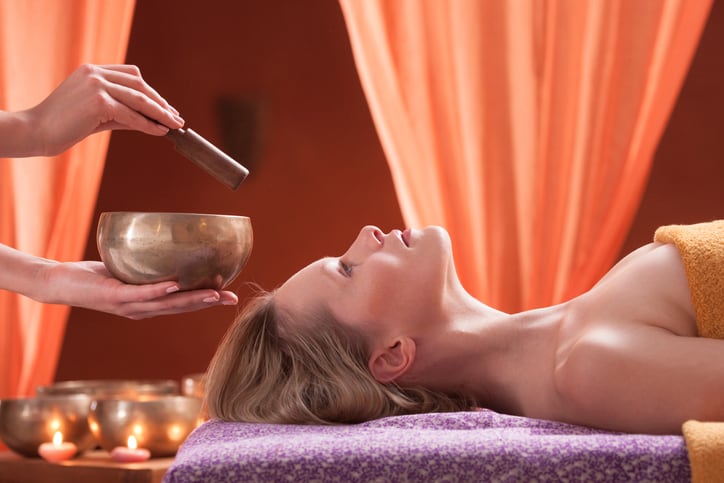Fragrance has long been used as a tool to influence mood, create atmospheres, and evoke memories or emotions. It has also long been a form of self-care, but where this was once based on intuition, it is now gaining more scientific backing.
“The use of aromas to enhance mood and improve health and wellbeing dates back to 3,500 years BC, with many religious rituals and medicine regularly relying upon the properties of these aromatic scents,” explained fragrance evaluator at Carvansons Ltd Anthony Wilcock.
“Terms such as aromatherapy, mood-boosting scent and functional fragrances have only come into use in the last few decades though,” he continued.
However, Wilcock said the focus is now on “treating our minds and souls instead of ailments and health conditions.”
According to global project manager at Iberchem, María Ángeles López, while the role of fragrance as a mood enhancer is something that has always been known, advances in neuroscience have offered the scientific proof to give it more credibility.
“There are more and more studies on specific populations (geography is very important) that show that certain raw materials help to relax, energise, and feel happy,” said López.
A focus on mental health benefits
Marketing manager at Carvansons Ltd Vicki Last, notes the impact of fragrance on mental health, and how it can “have a profound impact on alleviating stress by engaging the olfactory system.”
“Stress now permeates every aspect of our life,” she said. “And it is expected that future generations will experience more stress and anxiety than any previous generation in history.”
“Fragrance can trigger personal memories or happy experiences or help with slowing heart rates and reduction in blood pressure or the release of endorphins,” she said.
“Now mainstream brands are capitalising on this trend for fragrances that not only smell good, but also do good and using these mood-enhancing benefits as part of their product benefits.”
This topic of fragrance and wellness is on the agenda for discussion at the upcoming In-cosmetics Global show from 8-10 April 2025, at the RAI Amsterdam.
It will be highlighted in a special Fragrance Zone, plus Denise Herich and Jennifer Stansbury from The Benchmarking Company, are set to present ‘Fragrance Frenzy: Scents & Emotions Consumers Crave from Your Brand’ on 9 April.
Promoting relaxation in a busy world
Different ingredients can induce a variety of moods and emotions. Some key ingredients for promoting relaxation and relieving stress include lavender, chamomile, sandalwood and linalool.
Technology specialist in neuroscience at Iberchem, Vasco Fontes Marques Da Silva, discusses the role of ingredients like lavender or linalool in promoting relaxation and lowering stress.
“These ingredients are shown to induce a slower heart rate and less sweat released by our skin glands, which altogether generate a calmer mood,” he said.
“For boosting energy usually there is a connection with citrus and fresh ingredients which tend to promote a higher arousal feeling in participants.”
Meanwhile, Camille Dalbert who is a perfumer at Ravetllat Aromatics, said: “chamomile has a calming effect, making it ideal for stress relief. Sandalwood is associated with serenity and calm, while bergamot is often used to reduce anxiety and improve mood.”
“Ylang-ylang also has a calming and balancing effect on the nervous system, helping to reduce stress,” she continued. “This floral note is known to induce tranquility, much like the creamy and warm vanilla notes that are expected to be trendy in 2025.”
Wilcock highlighted that science backs up use of lavender, with experiments suggesting that the floral scent possesses anxiolytic, sedative, analgesic, anticonvulsive and neuroprotective properties.
“Smelling lavender and rosemary also increases a biological process called free radical scavenging, which protects cells from damage and can decrease cortisol levels, which contribute towards our stress levels,” he explained.
Fontes Marques Da Silva also highlighted the benefits for citrus ingredients. “For boosting energy usually there is a connection with citrus and fresh ingredients, which tend to promote a higher arousal feeling in participants.”
While Dalbert drew attention to peppermint, which is said to be stimulating, improves concentration and reduces fatigue.
“Eucalyptus is invigorating and can improve mental clarity and alertness. Citrus fragrances like lemon, orange, and grapefruit are energising and help clear mental fog, boosting energy levels,” she said.
“Rosemary improves memory and mental clarity, making it a great way to focus. Ginger is energising and promotes vitality. Juniper berry is also known for its refreshing and revitalising scent, making it an excellent choice for boosting energy and reducing stress.”

Fragrance and cognitive performance
Perfumer at Ravetllat Aromatics Jana Pascual said the field of fragrance research is evolving quite rapidly, with scientists and innovators exploring the intricate connections between scent and human well-being.
“One of the most thrilling areas of research is aromatherapy for stress and anxiety. Specialists are studying how essential oils and fragrances, like lavender, chamomile, ylang-ylang, amongst others can reduce stress and anxiety by influencing the limbic system, which governs emotions,” she said.
“There is also the exploration of the fragrance as a mood enhancer, that investigate how citrus and floral scents may combat depression or lethargy by promoting a sense of upliftment and positivity,” she continued.
Another field of research that is gaining traction is fragrance and cognitive performance.
“Investigation is uncovering how rosemary and peppermint scents may enhance memory retention and cognitive function, with potential applications in education and age-related cognitive decline,” said Pascual.
“Aldo, natural raw materials like lemon and eucalyptus are studied for their potential to boost concentration and reduce mental fatigue, particularly in work or study environments.”
Fragrance and a spiritual focus
According to perfumery marketing specialist at Scentmate by dsm-firmenich, Léa Martin, another area to watch is younger fragrance shoppers rediscovering spirituality, as this is now also “redefining olfactory preferences.”
Martin noted that there has been an increased demand for fragrances that evoke spirituality “especially for those seeking a path to emotional balance and inner peace.”
Martin said revealed that the percentage of scent consumers interested in alternative rituals such as meditation, astrology, crystals, aromatherapy and tarot reading is growing and that it is “creating new types of spirituality that blend the mundane with the divine.”






